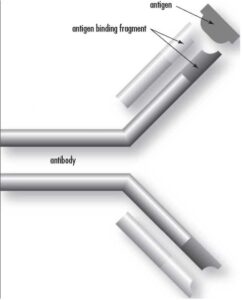Antibody
antibody A soluble immunoglobulin blood protein produced by the B cells, white blood cells. That develop in the bone marrow (also known as B lymphocytes, plasma cells) in response to an antigen (a foreign substance). Antibodies are produced in response to disease and help the body fight against a particular disease. By binding to the antigen and killing it, or making it more vulnerable to action by white blood cells. They help the body develop an immunity to diseases.
Besides each antibody has two light (L) and two heavy (H) immunoglobulin polypeptide chains linked together by disulfide bonds, with two antigen-binding sites. There
An antibody is a blood protein that is produced in response to and that counteracts an antigen. Antibodies are produced in response to
disease and help the body fight against particular diseases. In this way, antibodies help the body develop an immunity to disease. (Courtesy of Darryl Leja, NHGRI, National Institutes of Health)
are more than 1,000 possible variations, yet each antibody recognizes only one specific antigen. Antibodies are normally bound to a B cell. But when an antibody encounters an antigen, the B cell produces copies of the antibody with the assistance of helper T cells (a lymphocyte that undergoes a developmental stage in the thymus). The released antibodies then go after and bind to the antigen, either killing it or marking it for destruction by phagocytes.
There are five immunoglobulins: IgC, IgA, IgM, IgD, and IgE.





